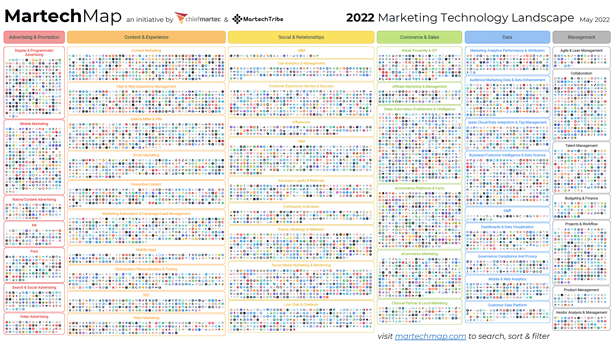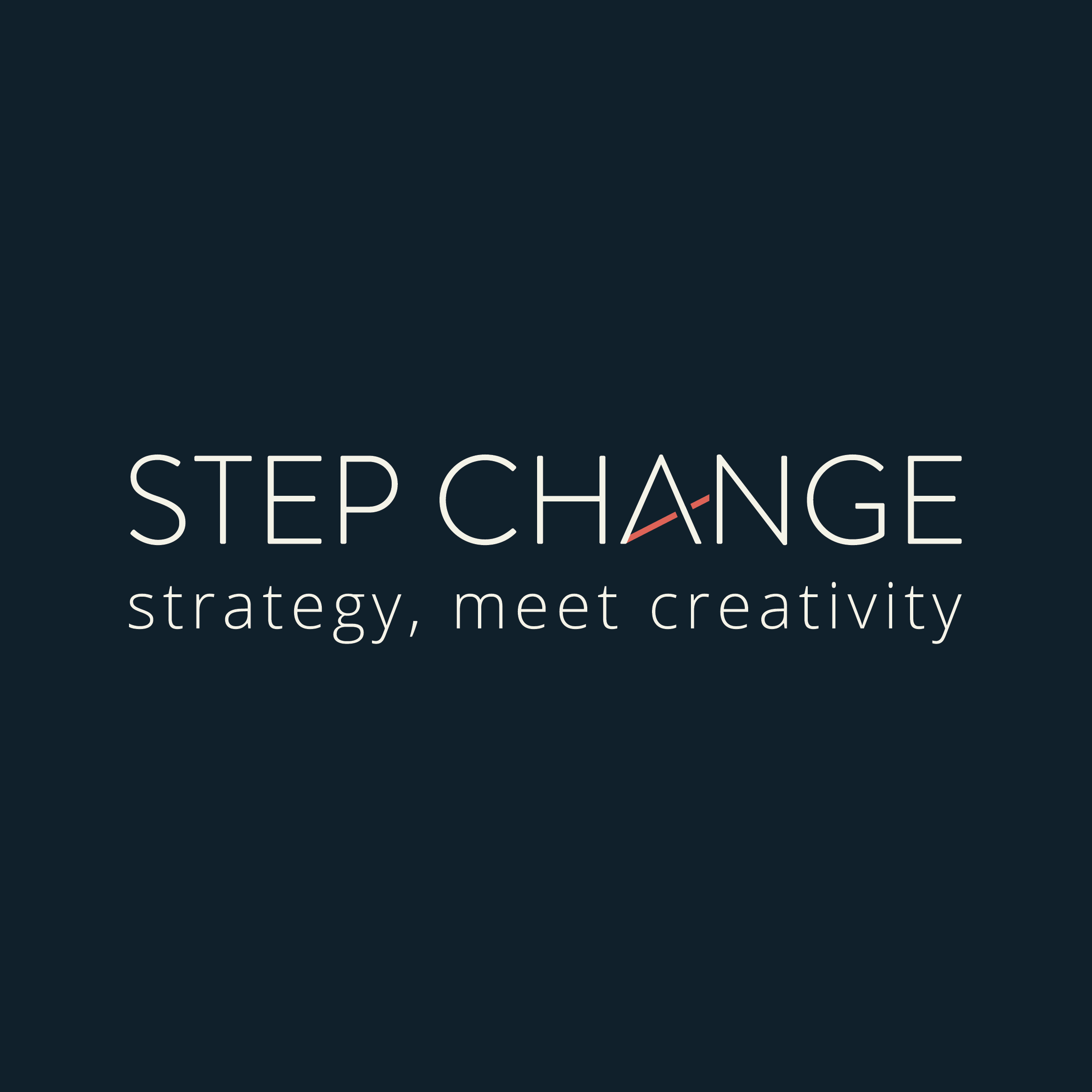What’s all this noise surrounding artificial intelligence? Is AI worth the hype? And how do you even get started? Do these questions sound familiar?
With marketing technology (martech) and AI becoming a critical part of mainstream business strategy, getting the buy-in from the top brass is essential. But lack of understanding, fear of the unknown, ethics, biases, and costs can get in the way.
So how do you demystify martech and AI and get the ball rolling?
Insight: It’s worth exploring which marketing technology and AI tools will help businesses improve their bottom line and drive results.
Data: 50% of digital transformation efforts are being led by board members. The same report finds that a substantial number of those decision-makers do not have a true knowledge of the technology that will make that transformation for them. (Futurum)
Key action point: This is where effective executive management comes in — marketers need to translate martech into the board’s language of bottom-line revenues and results.
Watch: Let Step Change CEO Ashton Bishop and Client Success Lead Noel Flowers answer your biggest questions on AI and marketing in a recession.
What Is Marketing Technology?
If you are using tech to reach a customer, then it’s martech. It’s everything — from tools to major initiatives — that takes advantage of technology to improve marketing activities and meet marketing goals and objectives.
Why are companies using martech? There are three major reasons:
- High-level insights. Martech generally allows for a more qualified analysis of data, which is free of human bias and error.
- Time management. Giving repetitive tasks to the automation algorithms creates more time for your in-house staff to focus on more meaningful work.
- Data collection. Computers can cull data from computers much more efficiently than humans can. Collection sweeps can quickly integrate and organise data from sources with different user interfaces.
The AI boom has undoubtedly penetrated the martech space. From streamlining processes, analysing data, making predictions, decision-making, and reducing workload for marketers, AI-powered martech tools have become a promising trend that is already revolutionising the playing field.
Does MarTech and AI Impact ROI?

While there is a lot to be learned about the AI boom, 63% of people don't realise they're already using AI technologies, so this should not exactly be new territory. In fact, 51% of marketing leaders already use AI since 2017.
These early adopters seem to reap the rewards of taking the AI risk. A total of 97% of marketing influencers say return-on-investment is increasing, with a 52% majority describing the increase as significant.
Majority of marketing tech influencers (93%) believe ROI should be achieved in less than a year. This is certainly possible if a marketing team, with the board's support, picks the right tools and uses them in the right way.
Overwhelmed By AI and Modern MarTech Landscape?
If you’re overwhelmed by the amount of news and solutions surrounding AI and martech — you’re not alone. The 2022 Marketing Technology Landscape Supergraphic showcases the continued growth of the martech industry. With 9,932 solutions (up 24% from 2020), the martech landscape is projected to grow towards 10,000 solutions in the coming year.

Credit: ChiefMartech
While the report could easily point you at hundreds to thousands of martech products, the huge number of choices could intimidate people and businesses from making a step change. The key to getting started? Identifying key business areas and the solutions needed to power them.
10 Marketing and AI Technologies Businesses Need

The organisation of your marketing technology stack comes only after you have identified the best tools for the job. Solutions will vary, but there are some overarching themes to all successful martech stacks.
Let’s take a look at the ten key business areas powered by AI:
1. Analytics
Business intelligence and analytics platforms are no longer luxuries — they are mainstream purchases that factor greatly into strategic planning efforts. Companies are also investing heavily in analytics experts, to the point of outpacing the investment in IT expertise.
Google Analytics is still far and away the most popular analytics tool. You will find it in over 80% of SMB websites. However, there are other options available for companies in need of a more niche-oriented solution.
Led by the popular Azure, Microsoft offers an entire suite of BI tools that provide an entire vertical for enterprise-level companies looking for personalised analytics.
- Tableau is a platform that is known for growing well with companies that are at a turning point.
- Qlik is an end-to-end data management and analytics platform that has been essential in many digital transformation efforts.
- Thoughtspot provides AI-driven analytics known for its speed and accuracy, especially in finding hidden connections and trends in data.
- Salesforce is well known for its ability to analyse data and integrate easily into its own vertical, including CRM and other sales tools.
2. Conversion Optimisation
It’s important that marketers understand how web visitors navigate through their website, what actions they take, and why they’re not converting (filling out a form, purchasing something from your website, making an inquiry, etc.). Marketers need martech to ensure web visitors are taking your desired action.
- A great tool for companies on a budget, Wordstream’s free Landing Page Grader offers a great deal of value that connects directly to your AdWords account for best results.
- Optimizely is a great tool to have if you are testing multiple sites for your marketing campaign or you need help in generally deploying your next marketing solution.
- Unbounce is a proven landing page software known for improving marketing ROI.
3. Email
Email is the most personal and cost-effective way to connect and engage people who have shown interest in what your business offers.
- MailChimp is a popular, full stack email marketing tool that many small businesses use to connect with growing audiences.
- Constant Contact is a highly effective streamlined platform that is great for sending email stories and automating lead generation.
- ActiveCampaign is a marketing automation software that automates your email marketing, sales, and customer engagement. With its AI-powered predictive analytics, it’s great for personalised communication and predicting customer behaviour.
4. Search Engine Marketing
SEM uses paid advertisements that are displayed on search engine results pages (SERPs). It is so powerful as it provides businesses with the opportunity to show their ads in front of potential customers who are ready to buy at a given moment.
- Google AdWords is the most popular search engine marketing tool as it comes from the same company as the #1 search engine in the United States: Google. With AdWords, there is no “educated guessing” on many aspects of your campaign — you get the insider’s track on everything you are doing.
- Bing and Yahoo take the #2 and #3 top spots for search engines, and they are also formidable digital traffickers in their own right. The strategy required to succeed here is a bit different from Google, which is why they deserve their own listing if you are looking to market on their platforms.
- WordStream is a top-rated AdWords tool that also integrates well with the algorithms of other major and niche search engines.
5. Remarketing
Remarketing is all about positioning ads — whether in text, image, or video form — in front of targeted people who had previously visited your website as they browse other websites on the Display Network.
- Google AdWords remarketing is a growing subdiscipline in AdWords market programming that is becoming bigger as we speak. It integrates automatically into your current Google AdWords campaign, culling statistics directly into your reports in real time.
- AdRoll helps you grow your business as a silent ‘stalker’ that accurately markets to your targets based on their online behaviour. This is a great alternative that is proven to work in many industries.
- Perfect Audience from Marin Software focuses on web and Facebook retargeting. This is a great tool to have for tracking your audience if your campaigns centre around Facebook.
6. Mobile
Ultimately, the key to mobile success is designing a website that’s responsive. This means it needs to be optimised for the mobile platform. The major search engines now punish websites that do not have this feature, so it should be a priorty if it is not already.
- Leanplum is a mobile marketing platform that delivers meaningful engagement across messaging and the in-app experience. It’s great for optimising mobile app marketing campaigns, including push notifications and in-app messaging.
- Braze is a SaaS platform designed to help brands create personalised experiences that foster stronger connections between consumers and brands. This is a tool for brands that prioritise real-time interactions with customers.
- CleverTap is designed to help you engage with customers across multiple channels and improve user retention. It specialises in providing personalised experiences to customers by collecting and analysing user data from various online and offline sources.
7. Marketing Automation
Marketing automation enables you to provide a better experience for your customers. It mechanises your repetitive marketing processes, freeing you and your team of those tasks so you can do meaningful work.
- HubSpot is a full-stack marketing vertical that includes automation at many critical steps. The platform is extremely popular and growing.
- Act-On is a platform that integrates well into the current marketing infrastructure of a company, automating rote activities that would normally take up creative marketing time.
- InfusionSoft by Keap is an advanced marketing automation platform that does well with companies that rely heavily on CRM.
- Marketo focuses on automation that increases engagement so that your salesmen have plenty of opportunities to close hot and warm leads.
- Adobe Campaign is the production software’s titanic expansion into marketing automation and customer service. It is well known for being able to automate the customer journey, giving marketers plenty of data to cultivate strong campaigns.
8. Content
Content marketing is critical in building brand awareness, generating leads, and driving conversions. By producing valuable, informative, and relevant content, businesses can position themselves as thought leaders, educate their audience, and ultimately drive sales.
- ChatGPT is an AI chatbot that uses natural language processing technology to have human-like conversations. It’s great for research, content creation, and writing blogs, captions, scripts and more.
- Jasper is an AI writing tool specialising in generating marketing copy for businesses. It helps businesses create content such as blog posts, product descriptions, bios, ad copy, and more while staying on brand.
- Grammarly is an AI-powered writing assistant that checks your grammar, spelling, and punctuation, and provides suggestions for clarity and style.
9. Design
At a time when distinctiveness and differentiation drive a business’s success, design has become a more critical area than ever before. Staying on top of design tools can greatly impact your company’s brand perception, customer engagement, communications and overall success.
- Adobe Sensei is an AI-powered platform that offers design, video, and photo editing tools that automate repetitive tasks, and enhance image quality, all within the Adobe suite.
- Canva is an AI-powered graphic design platform that provides pre-designed templates, elements, and assets to help non-designers create professional-looking designs.
- Piktochart is an AI-powered infographic maker that simplifies information design and enables users to create visual stories, reports, and presentations with pre-designed templates and data visualisation tools.
10. Operations
With disruption coming at all fronts, getting maximum results out of your resources is important, and your operations play a crucial role in ensuring that. Optimising the management and efficiency of your processes, systems, and resources helps you achieve goals, reduce costs, and maximise profits.
- UiPath is an AI-powered robotic process automation (RPA) platform that automates repetitive, manual tasks, freeing up employees to focus on higher-value work.
- WorkFusion is an AI-powered automation platform that streamlines operations most useful for businesses looking to automative business processes, such as data entry, customer service, and financial management.
- Tettra is an AI-powered knowledge management platform that helps teams share and organise information, making it easily accessible and actionable.
Tying It Together
With so many tools available, the true challenge is getting the buy-in for the marketing vision from top to bottom. This begins with a proper explanation to the board of the tools that are being used.
As a board member, you carry the responsibility of ensuring the health and overseeing the direction of the entire organisation. And nothing is worse than a business that refuses to evolve. The intention is not to jump on to every trend that enters the market, but being open to tools that could potentially revolutionise the way you do business.
The old ways of thinking no longer work, and the ways of working have changed. You can begin demystifying the world of martech by starting with the tools above. Once you have opened the doors and shown exactly how they bring results and revenue, you can begin turning them on to some of the more esoteric tools in your repertoire.
Unlock your strategic roadmap and get a clear picture of what is and isn't working for your business with Lockstep Baseline today. Ready to cut through the noise and nonsense?









